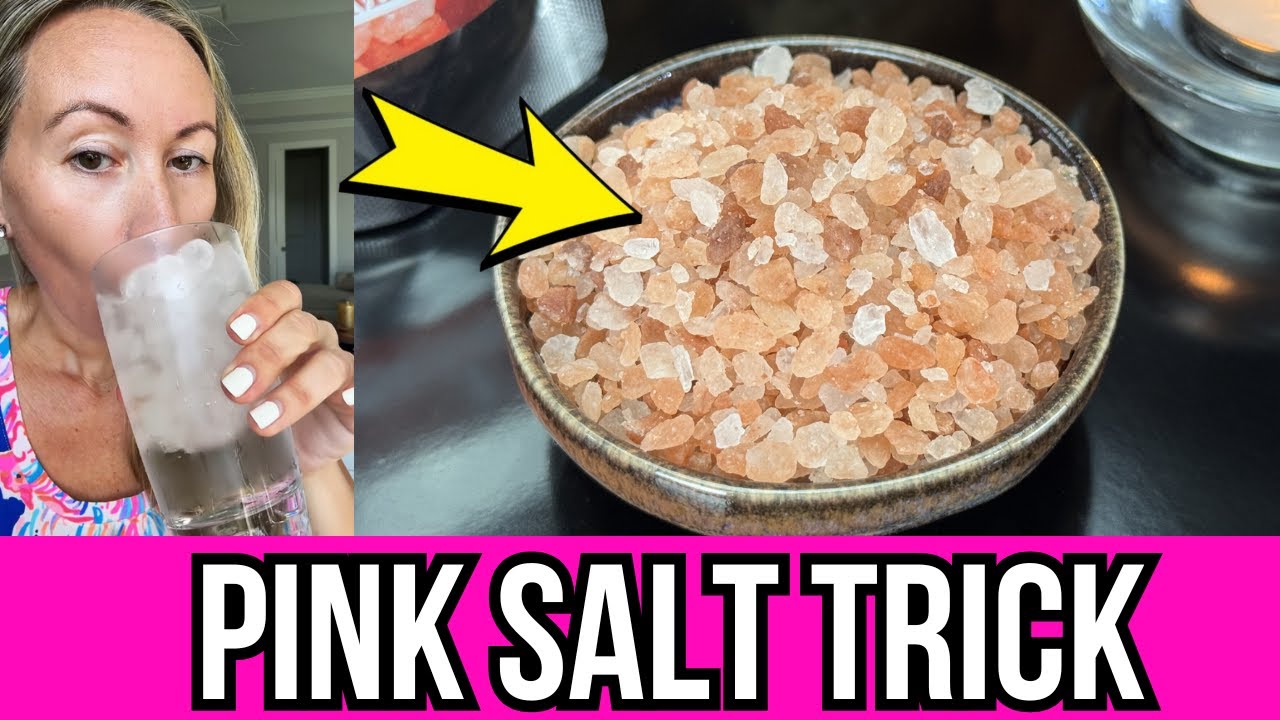In the summer of 2025, social media feeds filled with videos claiming Oprah Winfrey had finally shared her “secret pink salt trick” for weight loss. TikTok clips, YouTube shorts, and even fake ads suggested that Oprah endorsed a simple drink made from Himalayan pink salt, warm water, and lemon as a way to burn fat and flatten your stomach.
But here’s the truth: Oprah has never promoted this so-called pink salt trick. According to fact-checkers at ABC10 and Snopes, the videos circulating are AI-generated deepfakes designed to lure people into buying supplements or clicking shady links.
Still, the question remains: even if Oprah never endorsed it, does the pink salt drink itself have any real health or weight loss benefits? Let’s break down the science, the recipe, and the risks.

What Is the Oprah Pink Salt Trick?
At its core, the recipe is simple:
-
½ teaspoon Himalayan pink salt (or Hawaiian pink salt)
-
8–12 oz warm or room-temperature water
-
Juice from ½ lemon (optional)
-
1 tsp apple cider vinegar or cayenne pepper (optional)
The drink is usually consumed first thing in the morning, often promoted as a “detox water” or “fat-burning hack.” Supporters claim it:
-
Flushes out toxins
-
Reduces bloating
-
Boosts metabolism
-
Helps burn stubborn belly fat
But are these claims scientifically valid?
Did Oprah Really Endorse the Pink Salt Trick?
The short answer: No.
-
Fact Check Sources: Multiple outlets, including Snopes and ABC10 News, confirmed that Oprah never promoted the pink salt trick.
-
AI-Generated Content: Fake ads and deepfake videos have been circulating, falsely showing Oprah endorsing the recipe.
-
Oprah’s Real Wellness Views: Oprah has been open about her struggles with weight and health, but she has never linked her wellness journey to a pink salt drink.
In fact, Oprah herself has publicly warned followers to be cautious of scam products using her image without permission.

The Science Behind Pink Salt and Weight Loss
While Oprah never endorsed it, let’s explore whether the drink itself could help with weight management.
1. Hydration and Appetite Control
Drinking warm water with lemon and a pinch of salt in the morning can improve hydration, which is linked to better appetite regulation. Sometimes, thirst is mistaken for hunger.
2. Electrolyte Support
Pink salt contains trace minerals like magnesium, potassium, and calcium. While the amounts are tiny, they may support electrolyte balance, especially if you sweat a lot or follow an active lifestyle.
3. Digestion and Bloating Relief
Lemon juice and warm water stimulate digestion, while salt may help balance stomach acid. This combination could reduce bloating, giving the appearance of a slimmer waistline.
4. Not a Fat Burner
However, there is no scientific evidence that pink salt directly melts fat or speeds metabolism. Any weight loss people report is more likely due to:
-
Drinking more water
-
Eating less junk food while trying the trick
-
Temporary water-weight changes
Risks and Side Effects of the Pink Salt Trick
While generally safe in small amounts, the pink salt drink isn’t risk-free.
-
High Sodium Intake: Too much salt can raise blood pressure and strain the heart.
-
Kidney Stress: People with kidney disease should avoid extra sodium.
-
False Expectations: Believing it’s a “miracle” can distract from sustainable weight loss habits.
Experts recommend no more than 1 teaspoon of added salt daily. The pink salt trick typically calls for ¼–½ teaspoon, which is safe for most healthy adults—but only if total sodium intake stays balanced.
Safer Ways to Use Pink Salt for Health
If you like the idea of using Himalayan pink salt, there are healthier approaches:
-
Electrolyte water: Add just a pinch of pink salt to water during workouts for hydration support.
-
Mineral-rich cooking: Use pink salt in moderation when seasoning meals.
-
Morning lemon water (without salt): Lemon water alone offers hydration and vitamin C.
These habits can support wellness without the risks of exaggerated claims.
What Nutritionists Say About the Oprah Pink Salt Trick
Dr. Jen Caudle, a board-certified physician, told viewers in a recent interview:
“There’s no magic drink for weight loss. Pink salt water may help some people feel less bloated, but it won’t replace a balanced diet, exercise, and healthy sleep.”
Registered dietitian Kelly Jones, RD, also notes:
“Adding salt to your morning drink won’t melt fat. But if it helps you hydrate and cut back on processed snacks, it could indirectly support your goals.”
Oprah’s Real Approach to Health and Wellness
Instead of chasing quick hacks, Oprah has long emphasized mindful eating, balance, and emotional wellness. In her Weight Watchers partnership, she highlighted:
-
Eating more whole foods
-
Practicing portion control
-
Moving daily (walking, hiking, or strength training)
-
Prioritizing self-care and mental health
That’s a far cry from a viral TikTok recipe.
Should You Try the Pink Salt Trick?
If you’re curious, trying the pink salt drink once in a while is likely safe for healthy adults. It may help with hydration and bloating.
But if your goal is long-term fat loss, sustainable habits will work better:
-
Eat more fiber-rich foods (vegetables, fruits, whole grains)
-
Stay hydrated naturally (plain water, herbal tea, sparkling water)
-
Exercise regularly (cardio + strength training)
-
Get enough sleep (7–8 hours nightly)
Final Verdict: Myth or Helpful Habit?
The Oprah pink salt trick is mostly myth fueled by fake ads. While the drink may offer small hydration or digestion benefits, it’s not a fat-burning miracle. Oprah herself never endorsed it—and relying on it alone for weight loss is unrealistic.
If you enjoy the ritual, keep it as part of a balanced morning routine. But remember: true weight loss comes from consistent, healthy lifestyle changes—not viral shortcuts.
Key Takeaways
-
Oprah has never endorsed the pink salt trick—ads showing her are fake.
-
The drink may help with hydration, digestion, and bloating, but it doesn’t burn fat.
-
Too much pink salt can be harmful due to high sodium levels.
-
Oprah’s real health approach emphasizes balance, mindfulness, and sustainability.